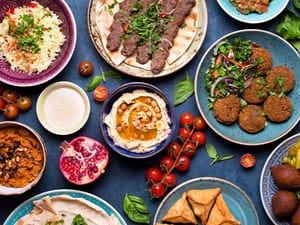
There are different practices all over the world regarding what Muslims can and cannot eat, and often a lot of diversity within a Muslim community as well. Different Muslims themselves will also follow different practices around what they can and cannot eat. In general, however, there are some accepted foods and drinks in Islam that are widely considered forbidden.
Let's delve into a more comprehensive list of foods that are regarded as 'haram' or forbidden, alongside their respective references in the Quran:
- Pork and its by-products: This includes lard, bacon, and pig-based gelatin, as mentioned in Surah 2:173, 16:115.
- Dead meat: Meat from animals that have died due to causes other than proper slaughter, as referred to in Surah 2:173, 6:145.
- Blood: Any form of blood is considered forbidden according to Surah 2:173, 6:145.
- Alcohol and intoxicants: All forms of intoxicating substances are prohibited, as outlined in Surah 5:90.
- Animals slaughtered for other deities: Any animal sacrificed in the name of a being other than Allah is forbidden, as highlighted in Surah 2:173, 6:145.
- Carnivorous animals and birds of prey: Predatory animals and birds are generally prohibited based on Islamic scholars' consensus.
- Animals that died by non-natural causes: Animals that have been strangled, beaten, killed by a fall, or by goring are considered haram according to Surah 5:3.
- Food over which Allah's name has not been mentioned: If Allah's name is not pronounced at the time of slaughtering, such food is forbidden as stated in Surah 6:121.
- Domestic Donkeys: The meat of domestic donkeys is prohibited based on Hadith narrations.
These foods and substances are typically absent from the diet of observant Muslims around the world, in different communities and Muslim denominations.
In the Quran, the forbidden foods include the meat from animals which died of causes other than slaughter, all blood, the meat and by-products of pigs, and any food ritually dedicated to a god other than Allah. Wine and alcohol are also considered forbidden in Islam, and many Muslims will avoid these drinks.
Many Muslims will not consume food that has been cooked with alcohol, even if it will not make them intoxicated. When it comes to the consumption of animals, many Muslims will only consider animals that have been ritually slaughtered to be considered ‘halal’. This includes being slaughtered by a trained religious individual, with a knife sufficiently sharp and large to meet religious specifications, and in a single fluid motion.
Permitted animals generally include animals that graze, such as: Sheep, goats, cows, chicken, deer, geese, turkey, duck, qual, buffalo, camels, and other animals which eat grass and work in the fields. Animals which are not permitted to eat include predatory animals and birds, as well as a number of insects and rodents which are considered unclean.
The animals which Muslims cannot eat include: Lions, tigers, wolves, bears, monkeys, elephants, foxes, cats, dogs, squirrels, and other animals which are known to eat other animals. This concern includes birds of prey as well. As such, birds whose consumption is considered forbidden in Islam include: eagles, bats, hawks, falcons, jays, ravens, and other birds who behave in a predatory manner. Rodents and reptiles are also considered unclean, and thus most Muslim scholars consider them to be forbidden foods for Muslims. These include: Mice, rats, frogs, lizards, snakes, flies, snails, worms, and other such creatures.
What do Muslims eat?
While a focus is often placed on what foods are forbidden within the Islamic faith, it's essential not to overlook the broad array of culinary delights that are encouraged and savored within Muslim communities. Islam underscores the intake of 'tayyib' - wholesome, pure, and beneficial food. This array of food is as diverse as the global Muslim community itself.
- Halal Meat: This includes an array of permissible land animals such as cows, goats, sheep, and chicken, which have been slaughtered with respect to Islamic rites. With reference to the Quran, this manner of slaughter is described in Surah 6:118-119.
- Fish and Seafood: In general, all aquatic creatures are deemed halal, although there are certain Muslim scholars and communities that may uphold specific restrictions. This is alluded to in Surah 5:96.
- Fruits and Vegetables: Without exception, fruits and vegetables are halal and form an integral part of Muslim culinary tradition. These fresh produce items are central to countless traditional dishes across different Muslim cultures.
- Grains: Staple foods such as wheat, rice, oats, and barley are universally consumed and revered across the vast landscape of Muslim gastronomy.
- Dairy Products: Milk, cheese, yogurt, and other dairy products are enjoyed on a wide scale, granted they are void of non-halal additives.
- Honey: Honey holds particular significance within Islamic tradition, being mentioned in the Quran as a food of benefit in Surah 16:69.
At the heart of it all, Muslim culinary tradition encompasses a rich diversity of foods, from succulent meats to vibrant fruits and vegetables, all within the guiding principles of halal dietary laws. It is a reflection of the faith's respect for nourishment, health, and the celebration of God's bounties.
In conclusion, while the interpretations may vary, the underlying principle guiding Islamic dietary laws remains the pursuit of a lifestyle that upholds ethical and spiritual values.
6/22/2023 6:06:47 PM










